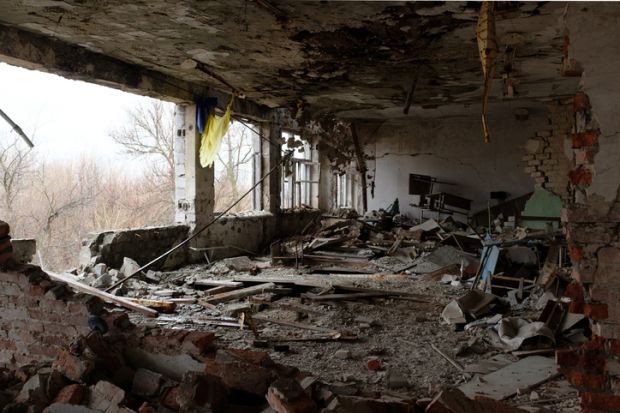The multiple casualties of Russia’s military aggression in Ukraine include its international higher education industry.
Before the war began, Ukraine was hosting close to 80,000 international students, from 155 countries. The main sources are developing or former communist nations, such as Azerbaijan, Egypt, Georgia, Morocco, Turkey, Turkmenistan and Uzbekistan. India is the single largest source country, providing 18,000 students. Nigeria sends over 4,000: more than China does.
The big draw is medical education. More than half of Ukraine’s international students study medicine, and of the 10 Ukrainian universities that enrol the most international students, all but two are medical universities. Kharkiv National Medical University hosted 4,215 international students in 2020, compared with only 1,838 at Ukraine’s flagship higher education institution, Taras Shevchenko Kyiv National University.
The students are attracted by low tuition fees, totalling just a few thousand dollars a year, and Ukraine’s relatively cheap cost of living, as well as by the abundance of medical places available. Competition for publicly funded admission to Nigerian medical universities, for instance, is intense, while recent tuition fee hikes of up to 200 per cent make the medical profession even more inaccessible for poor Nigerian youth.
When the Russian invasion started, however, international students pleaded for help to leave Ukraine. Their departure stories were adventurous and sometimes tragic. But their problems did not stop once they were beyond the range of the shells and missiles. Whether they reached their home countries or took up alternative residence in Europe, they faced more hardship, both financial and academic.
Amid displacement of faculty, students and even entire campuses, many Ukrainian universities began conducting their classes online. But while India’s National Medical Commission (NMC) is happy for theory classes to be taught remotely, it still insists that would-be doctors must have hands-on clinical training before they can be registered. Nor are medical students registered at foreign universities allowed to be accommodated at or transferred to Indian universities.
Similarly, the Medical and Dental Council of Nigeria (MDCN) stated that online medical training done in any country is “short of acceptable standard”. Degree certificates from Ukraine will not be recognised “until when normal academic activities resume” and students who are currently studying medicine or dentistry in Ukrainian medical schools are advised to “seek transfer to other accredited medical or dental schools in other countries for the completion of their programmes”.
Scepticism about Ukraine’s upholding of standards long predates the war, however. Nigerian medical graduates have to take national medical examinations in order to practise. But many of those educated abroad fail these examinations, while others have to retake them several times. Some of the students blame the prejudice of the Nigerian medical board and curricular mismatches, but Nigerian medics cite negligible clinical exposure among those educated in eastern Europe – and also in China.
The concern is that Ukraine’s low prices for medical education come with equally low quality. Saudi Arabia has not recognised Ukrainian medical diplomas since 2011, and Kuwait since 2017. Among other problems, Ukraine’s medical universities are notoriously corrupt. For instance, Bohomolets National Medical University in Kyiv, the second largest host of international medical students, and Odessa National Medical University, the third, both of which saw their rectors dismissed in 2018 amid corruption allegations.
A year on from the beginning of the Russian invasion, Indian and Nigerian medical students remain in limbo. The problems with degree recognition and worries about time-limited funding and graduation envelopes, as well as the cost of medical education elsewhere, has prompted some Indian students to return to Ukraine to finish their degrees despite the ongoing war. Nigerian students may follow their example.
But the question is how many more will register for degrees in Ukraine. The effects of the disruption and destruction, on top of the concerns about quality, may leave Ukrainian universities sounding distinctly monolingual even after the air-raid sirens fall silent.
Ararat L. Osipian is a fellow of the Elliott School of International Affairs’ Institute for European, Russian, and Eurasian Studies at the George Washington University in Washington, DC. He is also founding fellow of the New University in Exile Consortium at the New School, New York.
Register to continue
Why register?
- Registration is free and only takes a moment
- Once registered, you can read 3 articles a month
- Sign up for our newsletter
Subscribe
Or subscribe for unlimited access to:
- Unlimited access to news, views, insights & reviews
- Digital editions
- Digital access to THE’s university and college rankings analysis
Already registered or a current subscriber? Login








